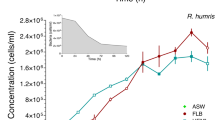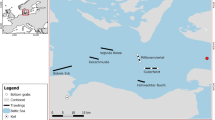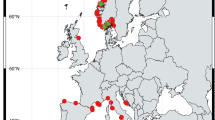Abstract
IN recent months we have been carrying out experiments on the behaviour of fish in heavy water. We find that goldfish (Carassius auratus) behaved quite normally in the heavy water in which they were kept. As heavy water was to be used as in dicator of normal water, we had to carry out our experiments in water containing only 0.5 mol. per cent of diplogen, and it is therefore still possible that a higher concentration of this isotope in water exerts effects upon fish.
This is a preview of subscription content, access via your institution
Access options
Subscribe to this journal
Receive 51 print issues and online access
$199.00 per year
only $3.90 per issue
Buy this article
- Purchase on Springer Link
- Instant access to full article PDF
Prices may be subject to local taxes which are calculated during checkout
Similar content being viewed by others
Author information
Authors and Affiliations
Rights and permissions
About this article
Cite this article
HEVESY, G., HOFER, E. Diplogen and Fish. Nature 133, 495–496 (1934). https://doi.org/10.1038/133495b0
Issue Date:
DOI: https://doi.org/10.1038/133495b0
This article is cited by
-
The weight of water
Nature Chemistry (2019)
-
Enterale Aufnahme und renale Ausscheidung von Tritium-markiertem Wasser bei wachen Ratten
Pfl�gers Archiv f�r die Gesamte Physiologie des Menschen und der Tiere (1966)
-
Fortschritte in der Erkenntnis der Biologischen Bedeutung des Schweren Wasserstoffs
Klinische Wochenschrift (1935)
-
Idrogeno pesante ed acqua pesante
Il Nuovo Cimento (1934)
-
Das schwere Wasserstoffisotop
Die Naturwissenschaften (1934)
Comments
By submitting a comment you agree to abide by our Terms and Community Guidelines. If you find something abusive or that does not comply with our terms or guidelines please flag it as inappropriate.



